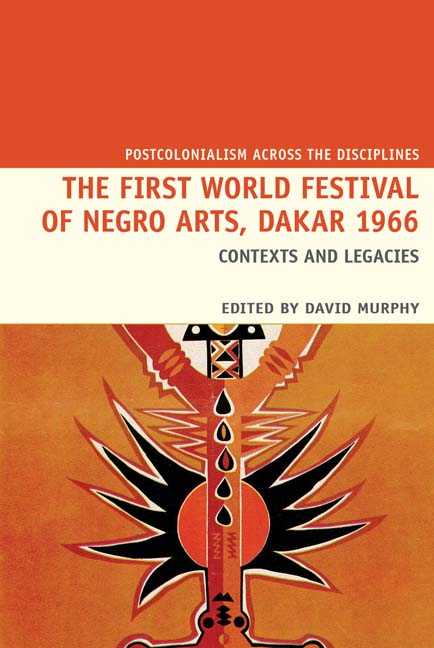Book contents
- Frontmatter
- Contents
- Acknowledgements
- List of Figures
- Notes on Contributors
- Introduction. The Performance of Pan-Africanism: Staging the African Renaissance at the First World Festival of Negro Arts
- I Contexts
- 1 ‘The Real Heart of the Festival’: The Exhibition of L'Art nègre at the Musée Dynamique
- 2 Dance at the 1966 World Festival of Negro Arts: Of ‘Fabulous Dancers’ and Negritude Undermined
- 3 Staging Culture: Senghor, Malraux and the Theatre Programme at the First World Festival of Negro Arts
- 4 Making History: Performances of the Past at the 1966 World Festival of Negro Arts
- 5 ‘The Next Best Thing to Being There’: Covering the 1966 Dakar Festival and its Legacy in Black Popular Magazines
- II Legacies
- Books and Films about the 1966 Festival
- Bibliography
- Index
3 - Staging Culture: Senghor, Malraux and the Theatre Programme at the First World Festival of Negro Arts
from I - Contexts
- Frontmatter
- Contents
- Acknowledgements
- List of Figures
- Notes on Contributors
- Introduction. The Performance of Pan-Africanism: Staging the African Renaissance at the First World Festival of Negro Arts
- I Contexts
- 1 ‘The Real Heart of the Festival’: The Exhibition of L'Art nègre at the Musée Dynamique
- 2 Dance at the 1966 World Festival of Negro Arts: Of ‘Fabulous Dancers’ and Negritude Undermined
- 3 Staging Culture: Senghor, Malraux and the Theatre Programme at the First World Festival of Negro Arts
- 4 Making History: Performances of the Past at the 1966 World Festival of Negro Arts
- 5 ‘The Next Best Thing to Being There’: Covering the 1966 Dakar Festival and its Legacy in Black Popular Magazines
- II Legacies
- Books and Films about the 1966 Festival
- Bibliography
- Index
Summary
The theatrical work presented at the 1966 Festival mondial des arts nègres in Dakar (now commonly referred to as FESMAN) played a pivotal role in helping the event to navigate the political and artistic stakes of a new postcolonial era. Three works made up the Francophone theatrical programme: a production of La Tragédie du Roi Christophe, written by Martinican playwright Aimé Césaire and staged by French director Jean-Marie Serreau (Figure 11); La Mort de Guykafi, by the Gabonese writer and politician Paul de Vincent Nyonda; and Les Derniers Jours de Lat Dior, by Amadou Cissé Dia, then Senegalese Interior Minister. The programme included the same number of Anglophone works: Hannibal, by Ethiopian socialist writer Kebbede; The Savant, by Lady Diawara, wife of the Gambian Prime Minister; and The Passion Play, performed by the Panafrican Players of Great Britain. Also central to the event's theatrical line-up were the nightly performances of the Spectacle féeriqueon nearby Gorée Island. This large-scale performance was billed as ‘deriv[ing] from the newest methods employed in live “Son et lumières” entertainment’ (Spectacle féerique 1966: 22) and presented a commemoration, through a series of tableaux, of the island's history, beginning with the sixteenth century, moving through the era of the slave trade, and ending with a celebration of Senegalese independence.
Weaving the performance of text with multiple musical and dance interludes, each of the theatrical productions at FESMAN appealed to multivalent understandings of a new pan-African citizenship that included dialogical, visual and auditory forms of participation. The multidisciplinary approach of these works fits within the tenets of théâtre total, a term that in the French West African context had emerged to describe a work whose combined use of text, music and dance not only reflected a sense of dramaturgical balance but also evinced what could be considered an authentic familiarity with the repertoires of local folklore and tradition. Works of théâtre total were thus seen as representative of the customs and artistic practices of the population from which they hailed. Furthermore, they frequently echoed the ethnographic works of earlier anthropological writings that were coeval with this theatre's emergence in the colonial context.
- Type
- Chapter
- Information
- The First World Festival of Negro Arts, Dakar 1966Contexts and legacies, pp. 93 - 106Publisher: Liverpool University PressPrint publication year: 2016



